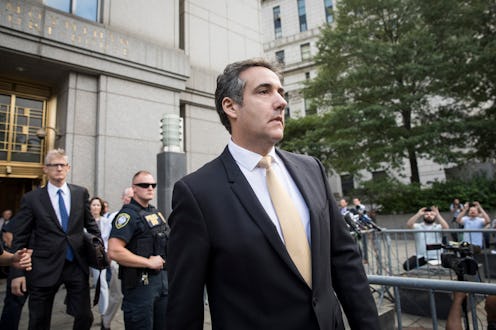News
This Is How Long Michael Cohen Could End Up In Jail If Prosecutors Have Their Way

President Donald Trump’s former personal lawyer will appear in court on Wednesday to receive his sentence after pleading guilty to multiple charges earlier this year. But exactly how long Michael Cohen goes to jail will be up to federal district Judge William Pauley. Prosecutors in New York have called for Cohen to serve a "substantial" jail term, though.
In August, Cohen pleaded guilty to eight counts of campaign finance violations, tax fraud, making false statements to a financial institution, and unlawful corporate contributions. Last month, he also pleaded guilty to lying to Congress about his contact with Russians.
The Southern District of New York wrote in a Friday court filing obtained by The New York Times that Cohen deserves a "substantial" prison term because of his "extensive, deliberate, and serious criminal conduct." Cohen's crimes "each involve deception, and were each motivated by personal greed and ambition," prosecutors wrote. They explained in the document that between 51 and 63 months (roughly five years) behind bars would fit with sentencing guidelines.
Cohen's defense team, however, asked for no prison time, noting Cohen voluntarily met with Special Counsel Robert Mueller's team seven times, as The New York Times reports. In the same vein, Mueller’s office wrote to the sentencing judge on Friday asking for some leniency for Cohen.
Pauley does not have to follow the sentencing range recommended by prosecutors, and Elie Honig, a former federal and state prosecutor, explained for CNN that he's typically "fair but tough."
"Judge Pauley can show mercy to a truly unfortunate or disadvantaged defendant, but he does not usually take kindly to abuse of power," Honig wrote.
Working against Cohen are prosecutors' claims that he didn't fully cooperate with the Southern District of New York. The office's sentencing memo argues that Cohen chose "not to pursue full cooperation," adding that "his professed willingness to continue to provide information at some later unspecified time" is useless because he's not obligated to do so and he's an unreliable witness.
Nevertheless, both Mueller's office and the Southern District of New York agree that when Cohen did cooperate, he was truthful. That consensus could create trouble for the president, as Cohen implicated a "candidate for federal office" in his first plea deal. Trump's former attorney said the unnamed political candidate directed him to make the illegal campaign contribution he was charged for.
His second plea didn't look good for Trump, either. Cohen admitted to lying about the timing of negotiations to build a Trump Tower in Moscow that took place during the 2016 campaign. Cohen said he made false statements to congressional investigators in order to align with Trump’s "political messaging," as The Times reports.
The president still maintains that Mueller's investigation is a "witch hunt," tweeting last month that Mueller's team has "gone absolutely nuts." Yet Cohen's sentencing on Wednesday will likely highlight Mueller's power to lock up those close to Trump, as well as send the message that cooperating with investigators doesn't necessarily lead to no jail time.